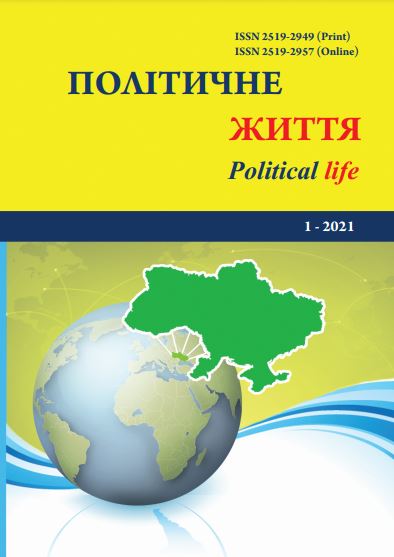Torture as an Element of Social Control in the 21st Century (Political and Legal Aspects)
DOI:
https://doi.org/10.31558/2519-2949.2021.1.9Keywords:
globalization; nation state; torture; ill-treatment; European Court of Human Rights; European Convention on Human Rights; Council of Europe; enhanced techniques of interrogation; prevention of torture; investigation of torture; preconditions for torture in the XXI centuryAbstract
The paper is focused on research of the phenomenon of torture in the XXI century. In the paper, the author presents a thesis that explains not only the resumption of torture as a phenomenon in the second half of the XX century but also spreading of the phenomenon of torture in the XXI century with corresponding dispersal of social control networks and, consequently, increasing of types of deviants. National criminal justice systems cannot cope with this task – to deal with deviants only within the formal procedures enshrined in national law against the background of increasing types and, consequently, the number of deviants. The article emphasizes that in the XXI century society torture exists within two interrelated political spheres, where the first of the spheres is a formalized policy of combating torture, which is shaped and implemented within universal regional and national structures. The second one is an informal torture policy, which is shaped within the framework of post-modern modulation of panoptic risk management, where torture is an instrument of modern social control. While criticizing the institutional and formal-instrumental approaches to the identification of the problem of torture and inhuman treatment in the XXI century and the solution of this problem, it is noted that these approaches are insufficient in their autonomous meaning. The dominance of institutional and instrumental approaches in the formation and implementation of policies of prevention of torture and the acquisition of monopoly characteristics by these approaches poses a problem in advance at the beginning of the strategy. Torture is primarily a political issue, and addressing it requires an analysis of the practice of torture as an impersonal policy with relevant statistical indicators that are now almost non-existent at both the international and national levels.
References
Ягунов Д. Тортури як інструмент сучасної політики соціального контролю. Політичне життя, 2020. Вип. 4. С. 46-54.
Ягунов Д. «Malleus Maleficarum» of modern society: preconditions and prevalence of torture in XXI century and the policy of combating torture. Вісник Донецького національного університету імені Василя Стуса. Серія Політичні науки, 2020. Вип. 5. С. 58-97.
Устранение стимулов применения пыток: Базовое исследование и практическое руководство для региона ОБСЕ. Варшава: Бюро ОБСЕ по демократическим институтам и правам человека (БДИПЧ) и организация «Fair Trials», 2020. С.16.
World crime trends and emerging issues and responses in the field of crime prevention and criminal justice. United Nations, Economic and Social Councilю Commission on Crime Prevention and Criminal Justice. Twenty-first session, Vienna, Vienna, 23-27 April 2012.
World crime trends and emerging issues and responses in the field of crime prevention and criminal justice. United Nations, Economic and Social Councilю Commission on Crime Prevention and Criminal Justice. Twentysecond session, Vienna, 22-26 April 2013.
World crime trends and emerging issues and responses in the field of crime prevention and criminal justice. United Nations, Economic and Social Council, Commission on Crime Prevention and Criminal Justice. Twenty-third session, Vienna, 12-16 April 2014.
Мировые тенденции в области преступности и новые проблемы в области предупреждения преступности и уголовного правосудия и способы их решения. Экономический и Социальный Совет ООН, Комиссия по предупреждению преступности и уголовному правосудию. Двадцать пятая сессия. Вена, 23-27 мая 2016 года.
Comparing International Criminal Justice Systems. Briefing for the House of Commons Justice. Committee Ministry of Justice. National Audit Office: SLS Print, February 2012. 51 p.
Ягунов Д. Пенітенціарна політика як складова соціального контролю. Одеса: Фенікс, 2020.
1.6 million police officers in the EU. URL: https://ec.europa.eu/eurostat/web/products-eurostat-news/-/ DDN-20190104-1
Harrington J. Cities with the Most Police per Capita. URL: https://247wallst.com/specialreport/2020/06/24/cities-with-most-police-per-capita/
Vollzeitäquivalent der Beschäftigten im Aufgabenbereich Polizei in den Kern¬haus¬halten des Bundes und der Länder, 30. Juni 2019. URL: www.destatis.de/DE/Themen/Staat/Oeffentlicher-Dienst/Tabellen/beschaeftigtenpolizei.html
By the numbers: US police kill more in days than other countries do in years. URL: www.theguardian.com/us-news/2015/jun/09/the-counted-police-killings-us-vs-other-countries
An N.Y.P.D. Sergeant Blows the Whistle on Quotas. URL: www.newyorker.com/podcast/political-scene/ an-nypd-sergeant-blows-the-whistle-on-quotas
Disgruntled cops say precinct ran arrest quota ‘board game’. URL: https://nypost.com/2015/03/31/disgruntled-cops-claim-precinct-ran-arrest-quota-board-game
Police reform: Theresa May's speech to the National Policing Conference Speech to the Association of Chief Police Officers and Association of Police Authorities National Conference on 29 June 2010, Manchester. URL: www.gov.uk/government/speeches/police-reform-theresa-mays-speech-to-the-national-policing-conference

